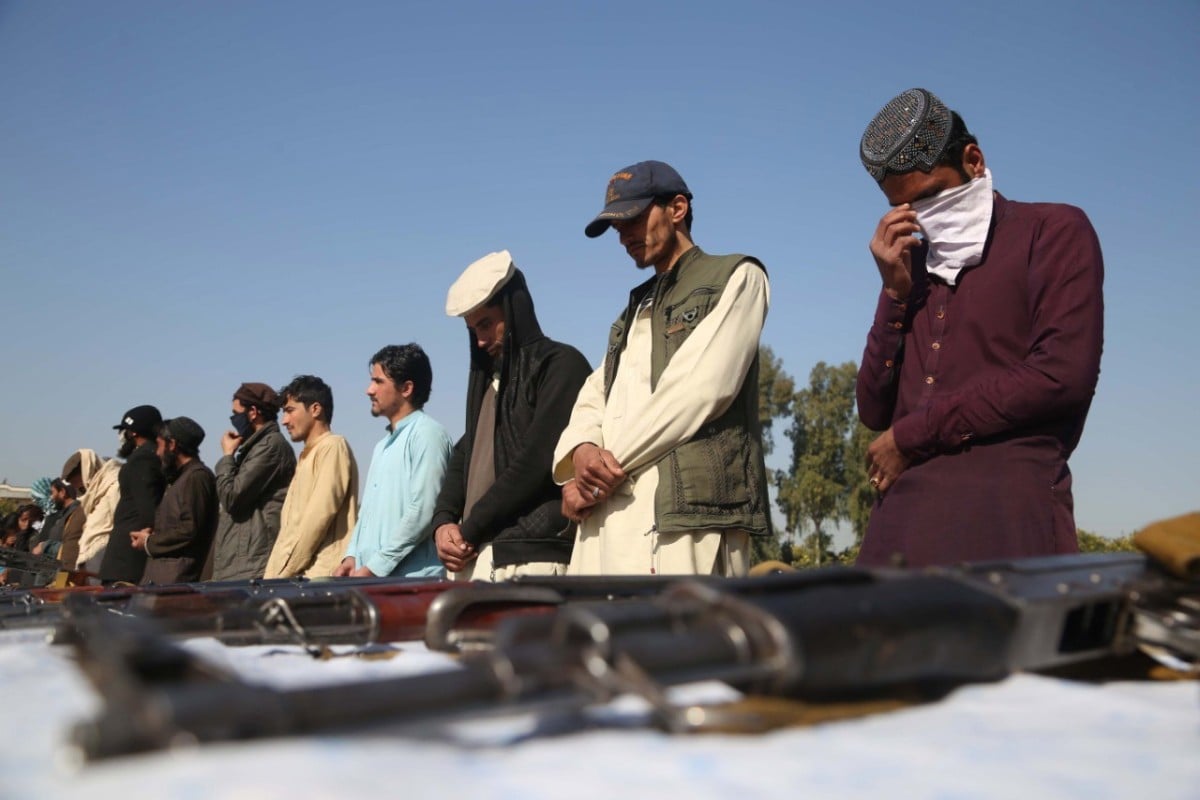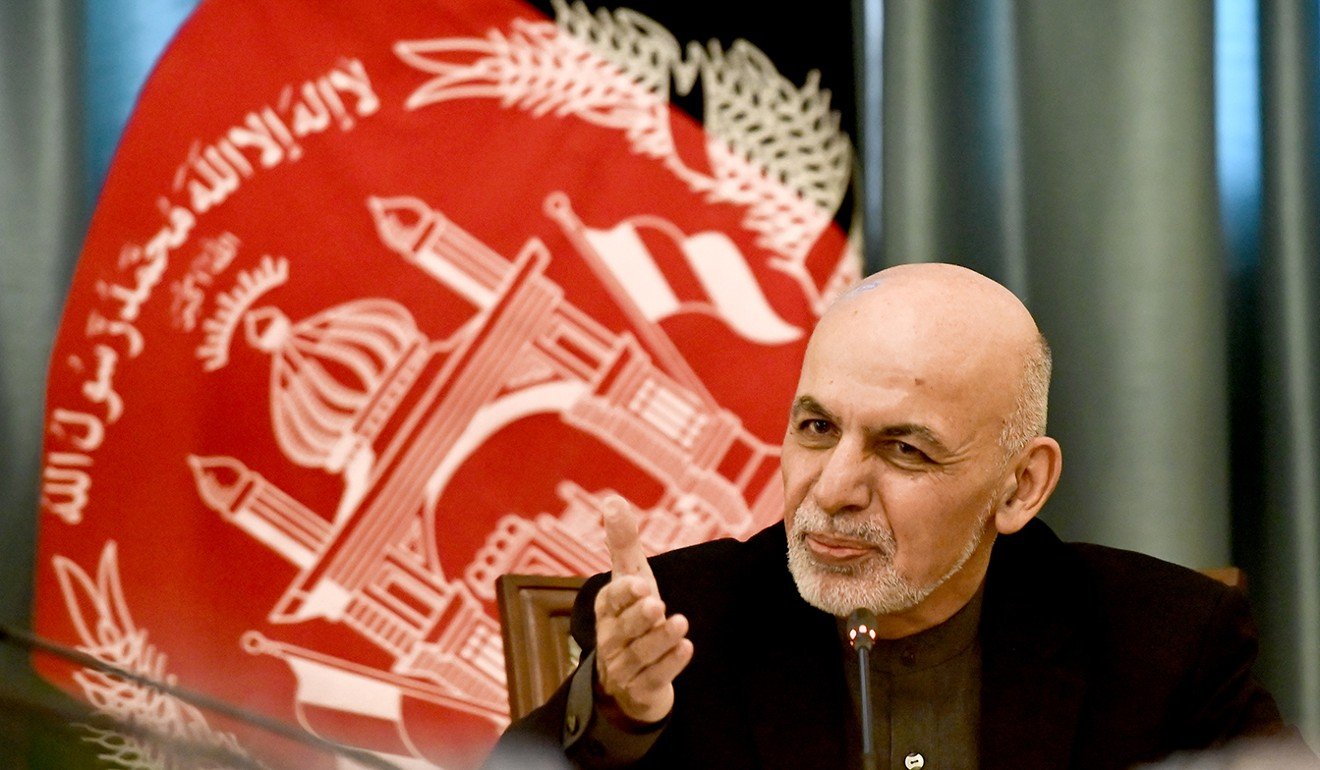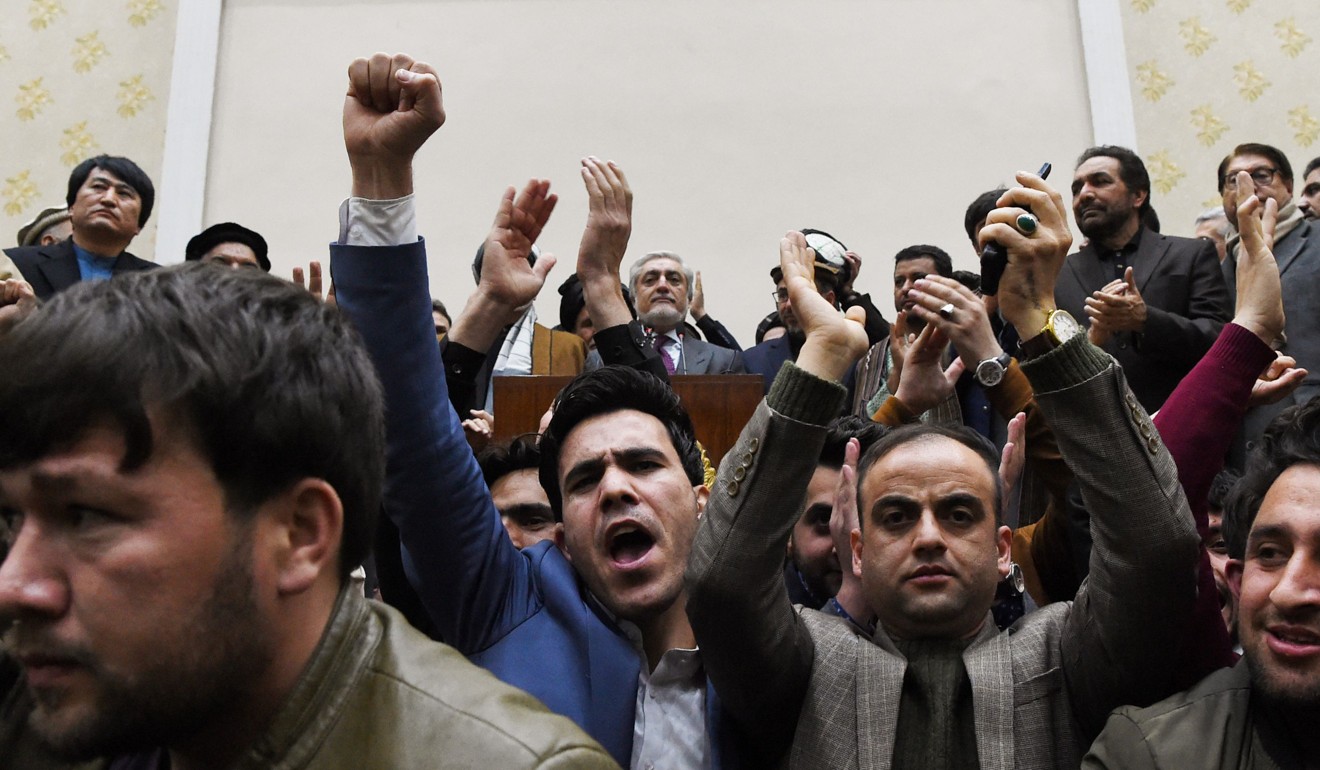Tom Hussain
A group of former Taliban militants surrender their weapons during a reconciliation ceremony in Jalalabad, Afghanistan. The Taliban is expected to sign a formal peace deal with the US by the end of this month. February. Photo: EPA-EFE
 After more than 18 years of war, the Taliban has agreed to a week-long nationwide reduction of violence, setting the stage for the signing of a peace deal by the end of this month that would see all US military forces depart
After more than 18 years of war, the Taliban has agreed to a week-long nationwide reduction of violence, setting the stage for the signing of a peace deal by the end of this month that would see all US military forces depart
The pause in Taliban attacks will also pave the way for negotiations with a government-appointed delegation of mainstream politicians over the country’s future.
But
China, which used its influence with close ally Pakistan to facilitate Taliban participation in negotiations with the US, has no plans to fill the political space on its southwest flank that will be vacated by departing foreign troops, according to analysts focused on the region.
 Afghan President Ashraf Ghani, who was confirmed the winner of the country’s September presidential election, with 50.64 per cent of the vote. Photo: DPA
Afghan President Ashraf Ghani, who was confirmed the winner of the country’s September presidential election, with 50.64 per cent of the vote. Photo: DPA
Any attempt to fill American boots in Afghanistan would aggravate tensions over Washington’s resistance against the Belt and Road Initiative (BRI) in South and Central Asia, they said.
Meeting with foreign ministers of the five Central Asian states in Tashkent earlier this month, US Secretary of State Mike Pompeo highlighted Chinese human rights abuses against the Muslim-majority indigenous population of Xinjiang province.
“Although the US and China have worked together closely on Afghanistan, and their interests remain aligned on some important issues, even here it’s becoming harder to avoid a spillover from their broader rivalry,” Andrew Small, a senior fellow at the German Marshall Fund in Washington, told This Week In Asia.
A radical decision by the White House or a breakdown in intra-Afghan talks both have the potential to reignite the 1990s civil war that erupted after Soviet forces withdrew, turning Afghanistan into a breeding ground for al-Qaeda.
Further conflict would facilitate the return of hundreds of Uygur militants who left Pakistan’s tribal areas and Afghanistan in 2015 to fight alongside al-Qaeda and Islamic State in Syria’s civil war.
To prevent a resurgence of violence in Xinjiang, where Muslims have been subjected to mass internment and “re-education” supposedly to prevent their radicalisation, China is greatly reliant on the success of the US-Taliban peace deal.
The Taliban has promised to prevent foreign terrorists from using Afghan territory under its control to launch attacks overseas, and to continue fighting the Islamic State affiliate which emerged in eastern Afghanistan in early 2015.
“China believes that foreign troops stationed in Afghanistan should be withdrawn in an orderly and responsible way, which will ensure a steady transition in the Afghan situation, avoid a security vacuum, and leave no chance to terrorist organisations to strengthen themselves,” Chinese Foreign Ministry spokesman Geng Shuang said on Tuesday.
However, Beijing’s diplomatic role is likely to become more peripheral during intra-Afghan talks because it is “less au fait with the nuances of Afghan politics than other actors that have had historically deeper engagement”, said Small, who is also the author of The China-Pakistan Axis.
“China is treading carefully in its Afghan diplomacy, and although it has been willing to act as a host, it has neither the capacity nor the will to act as an active mediator for intra-Afghan talks,” he said.
“It will want to stay engaged, help to facilitate, and potentially play a role as guarantor for any outcomes but if anything there’s less expectation now than there was a few years ago that Beijing will take a real lead in the process,” Small said.
Following an aborted Pakistan-based peace process in 2015, China has been involved in building the diplomatic momentum that recently yielded the “conditions-based” agreement and trial ceasefire between the US and Taliban.
After the launch in April that year of the China-Pakistan Economic Corridor (CPEC), a US$60 billion showcase programme of the Belt and Road Initiative, Beijing’s top diplomats persistently encouraged close ally Pakistan to use its leverage over Taliban leaders living in exile on its soil to enter into talks.
In its most prominent diplomatic intervention, State Counsellor Wang Yi stepped in to mediate a row between Kabul and Islamabad in September 2017 over the involvement of Pakistan-based militants in intensified Taliban attacks in Afghanistan. With his encouragement, the two governments agreed in December 2018 to establish a shared counterterrorism mechanism, and to push the Taliban to start negotiations.
Direct talks between US special envoy Zalmay Khalilzad and members of the Taliban’s Doha-based political office began weeks later.
Beijing’s diplomatic approach towards Afghanistan remained cautious throughout. It avoided undertaking solo initiatives that might be interpreted as an attempt to project geopolitical influence into its war-ravaged neighbour. Instead, its involvement has been conducted entirely through multilateral diplomatic forums involving the Afghan and other governments, or multilateral organisations like the Shanghai Cooperation Organisation.
China’s multilateralist approach fits the role that Afghans on all sides of the political fence foresee for it.
“I think that Afghanistan’s interests are best served by maintaining an even-handed and balanced relationship with key international stakeholders, especially those interested in Afghanistan’s stability, prosperity and economic development,” said Omar Samad, a former Afghan ambassador who is currently a senior fellow at the Atlantic Council, a Washington think tank.
“We cannot ignore our region in the same manner that we cannot disengage from our friends who have generously helped Afghans over the past decades,” he said.

A Pakistani soldier stands guard at Gwadar port, a multibillion-dollar development project with China aimed at constructing a 21st-century Silk Road. Photo: AFP
Despite signing a Belt and Road agreement with Kabul in 2016, and promising to fund US$100 million worth of projects, China has hitherto restrained its participation in infrastructure, connectivity and trade projects to initiatives launched by the Central Asian republics bordering northern Afghanistan, or as a partner in programmes led by the United Nations or World Bank.
The US State Department’s senior diplomat for South Asia, Alice Wells, noted this during a recent critique of CPEC. “I haven’t seen China take the steps that would make it a real contributor to Afghanistan’s stabilisation, much less stitching it back into Central Asia and the international community,” Wells said at The Wilson Centre in Washington in November.
However, China’s ambassadors in Kabul and Islamabad have both recently spoken about the “dream project” of a rail link from China through Central Asia and Afghanistan to Pakistan and Iran, envisioned under the Five Nations Railway Corridor.
With Iran under “maximum pressure” sanctions from the US, the Pakistan option is considered a more realistic prospect. If built, it would seamlessly connect the Silk Road Economic Belt, the overland component of the BRI, to CPEC infrastructure leading to the Chinese-operated Arabian Sea port of Gwadar.
That vision aligns with US ambitions to transform Afghanistan into a land bridge for electricity and natural gas from Central Asia to Pakistan, and possibly onwards to India if tensions between the South Asian neighbours can be resolved in years to come.
But Pakistan’s particular enthusiasm for the extension of CPEC into Afghanistan contrasts with its persistent refusal to allow overland trade between Afghanistan and India.
At present, the sense is that Beijing will be quite waryAndrew Small, senior fellow at the German Marshall Fund
Detailed negotiations between China and the US, as well as the regional states involved, would be required to prevent such projects from being entangled in their rivalries.
“The politics around connectivity investments will have to be managed carefully if it’s going to be possible to mobilise the economic commitments that will be required if peace efforts stick,” Small said.
It remains to be seen whether a surge in Chinese investment will be forthcoming if the peace process advances successfully. “At present, the sense is that Beijing will be quite wary,” Small said.
He expects Chinese leaders will be “even more careful in Afghanistan than they would have been several years back”, given Beijing’s experience with the local backlash in various countries against some BRI investments, the more adversarial dynamics with the US over these issues, and the government’s broader stocktaking over its approach on everything from financial risk to political risk. Events unfolding in Afghanistan seem to endorse China’s policy of caution.
The final results of the presidential elections held last August were announced on Tuesday, after a lengthy dispute over which votes would be counted.
Ashraf Ghani won a second term in office, despite polling less than a million votes from a nation of more than 37 million people. By a very slim margin, he avoided a run-off vote against leading rival Abdullah Abdullah, the government’s chief executive under a power-sharing arrangement with Ghani brokered by the US after similarly contentious elections in 2014.
Rejecting the results as fraudulent, Abdullah and two regional strongmen threatened to form a parallel government. They have also opposed Ghani’s “attempts to monopolise the peace process” by deciding the make-up of the delegation that would negotiate a political settlement with the Taliban. The Taliban also rejected Ghani’s re-election, and reiterated that it would not negotiate with a delegation appointed by his administration.

People cheer as Afghan presidential election opposition candidate Abdullah Abdullah, behind the podium, speaks to the media after the announcement of the final presidential election results. Photo: AFP
Former Afghan diplomat Samad said the timing of both elections and the talks as part of a peace process last year were “misaligned in my view, but despite apprehensions, some parties saw it to their advantage to force elections instead of postponing them”.
“At this stage, there is a real dispute over the credibility of results which impacts legitimacy and representation in prospective intra-Afghan talks. Lack of credibility is a key challenge to peace,” he said.
In such fluid circumstances, Samad advised China and all other international stakeholders “to maintain a friendly and constructive distance during intra-Afghan talks, if and when they start, but be willing to assist when needed”.
No comments:
Post a Comment